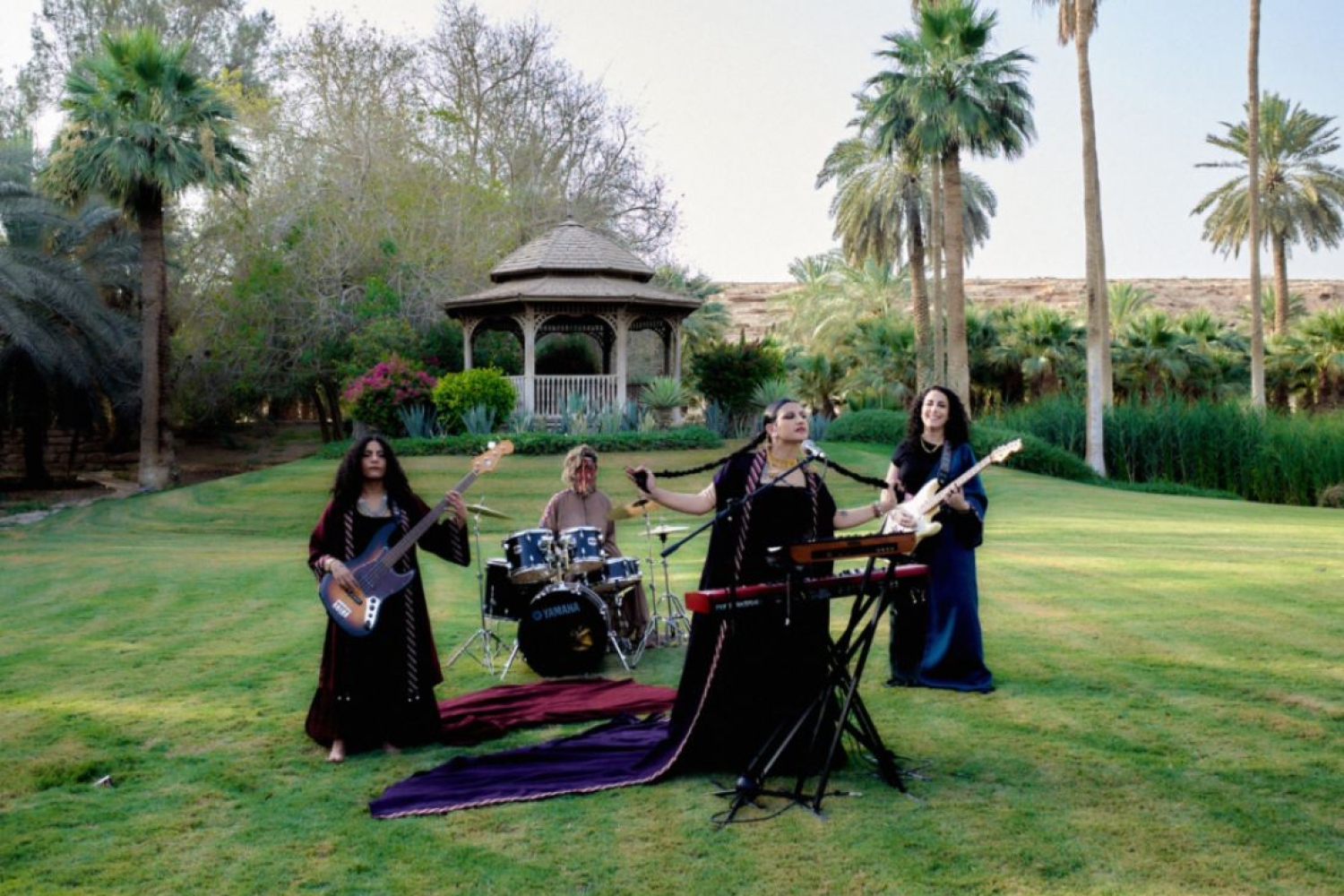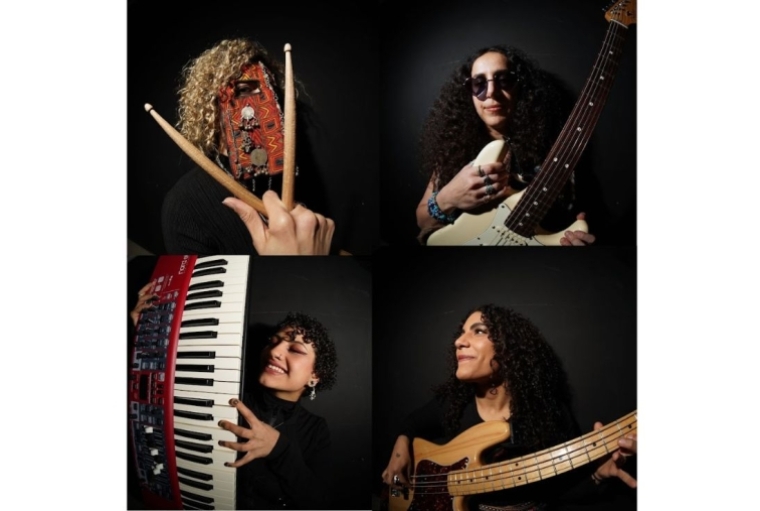

Among the inspiring and electrifying artists at the Riyadh Music Week, we got a chance to sit down with two band members [Haya and Thing] of Seera, a groundbreaking all-female psychedelic band from Saudi Arabia.
Guitarist Haya, Masked ‘Thing’ on drums, bassist Meesha and her sister, Nora on lead vocals and keyboard, together navigate the vibrant yet complex landscape of their homeland, drawing inspiration from the unique blend of gothic energy that permeates Saudi culture. This juxtaposition of tradition and modernity fuels their creativity, allowing them to craft a sound that is both haunting and transcendent.
We delved into how the state of the world around them—ranging from personal experiences and emotions to societal changes, cultural dynamics, and political landscapes—shapes their music. Excerpts from our conversation below.
In terms of creating music, what does each of you bring to the table?
Haya: In terms of music creation, each of us contributes individually with our instruments and ideas. We all compose our parts, while our frontwoman, Nora, is responsible for writing the lyrics.
And what does a day in a studio look like?
Thing: A typical day in the studio usually starts with someone coming up with a bass line, guitar riff, or melody. We jam together to see how it sounds, and if we like it, we record it on our phones. From there, we further develop the idea, with the lyrics being the last element to be added.
Does the melody come first, or the arrangement?
H: It's the melody. If there’s a bass line, for instance, we start with the bass and drums, allowing them to develop along with the structure of the song. We take the time to envision the entire composition and decide how to organize everything. This process helps us create a roadmap for the song, which we then refine further before recording in the studio.

Did you all meet because of similar musical interests, or was it the way one of you played that drew the others in? How did you decide on a cohesive sound as a group? It's clear you have one, but I imagine your music tastes might differ.
H: We share many commonalities, but we also have a lot of differences, which makes Seera particularly unique. For example, Meesh and Thing come from a strong metal background, while Nora and I have a deep interest in classical music.
Thing: Noora and Haya enjoy hip-hop and rap. I appreciate it, but not as much as they do. Noora also loves jazz and soul, and I have a passion for old Arabic music. Plus, we all enjoy psychedelic rock.
Because you like Omar Khurshid, and he is popular, but did you see him as a kind of aspirational person?
H: I discovered Omar Khurshid a few years ago and was pleasantly surprised to learn about Dick Dale. He’s known as the father of surf rock and happens to be of Lebanese descent. It’s astonishing to think that an Arab Lebanese man created a genre that took the U.S. and the world by storm. His influence is significant for me, especially with "Finna," which serves as my outro solo.
Umm Kulthum has been another monumental inspiration. When I hear her guitar parts, I’m often amazed and find myself wishing for more. One thing I think Omar Khurshid could have explored is the use of effect pedals. He was somewhat hesitant to go overly psychedelic, but just imagine if tracks like "Inta Amri" or "Elf Leila Ou Leila" had incorporated those effects. That could have entirely transformed the genre! Similarly, Umm Kulthum could have taken her music in a different direction. We’re all self-taught musicians.
Are you interested in incorporating more electronic elements into your music?
H: For instance, I found it exciting to watch Charlene develop from their first album, which had a very folky, rock vibe, to their more electronic sound. While I don't want to go as electronic as they have, I think it would be cool for us to add in some small elements gradually.
Nora, our lead singer, has also begun exploring production. She's produced several songs on our debut album and has a real talent for it. Initially, she only played the keys, but then she bought a synth and started experimenting with production. It's great to see her interest in learning more!
So did you start listening to your songs differently then?
T: When we first started writing music, it was quite simple, but we were happy with it because all we wanted to do was create. As we progressed, we listened back to our early recordings and thought, "What was that?" It felt like we were just trying to find our footing, like a child learning to walk.
Eventually, we decided to take the songs we really liked—those that resonated with our sound—and transform them by adding more depth and flavor. For instance, with "Passing Time," there's Haya, who is a multi-instrumentalist. Although she might hesitate to call herself one, I definitely will. She plays piano beautifully, guitar, and is also a DJ. She brings so much talent to our music.
What do you feed yourself with creatively other than music?
H: For me, it's all about the music.
T: I'm also a multidisciplinary designer and a huge film fan. I love watching movies and appreciating the cinematography, direction, colours, and lighting. It's fascinating how music interacts with cities and how urban planning influences it. This connection can lead to something chaotic, like polyrhythms, or draw inspiration from the overall atmosphere of a place.
Words Hansika Lohani